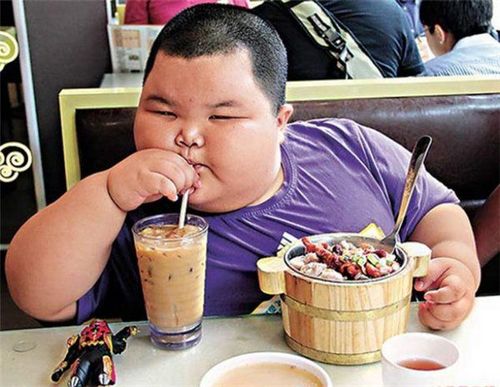This is an automatically translated article.
The article was professionally consulted with Doctor Ho Thi Hong Tho - Neonatologist - Pediatrics - Neonatology Department - Vinmec Phu Quoc International General Hospital.In general, chubby preschoolers are less worrisome than overweight or obese teenagers. But according to some experts, if children are severely overweight or obese from toddlerhood to kindergarten, the risk of continuing to be "oversized" increases.
1. To what extent is an overweight child worrisome?
Weight can put your child at risk for health problems like heart disease and diabetes, both now and in the future. While there's nothing to worry about if your child is a little chubby at this age, talk to your doctor to determine if your child's weight problems should start working out now.Children who are chubby in childhood are more likely to be overweight as adults, but this can also be just a temporary phase. So preschoolers may seem a bit heavy, but as their bodies change over the next few years, they'll look thinner. Children tend to get thinner when they begin to grow taller. Of course, it's not that the child stops gaining weight, it's that the height becomes proportionate to the weight.

2. Determining overweight and obesity in children
The doctor will measure the child's height and weight, and then draw a growth chart. Doctors today are using many different types of growth charts, which look at a child's body mass index (BMI) to see if height is commensurate with weight. Compared to weight, BMI also indicates whether a child is carrying too much body fat. Unlike the formula for calculating BMI for adults, BMI for children is also based on gender and age because their bodies are still changing and growing.Like a standard growth chart, your child will be ranked against children of the same age. If your child's BMI is in the 85th percentile - which is higher than 85% of children of the same age and sex, he or she is considered overweight. Children in the 95th percentile are considered obese.
In addition to your child's height and weight, the doctor will also take into account the parents' weight, the length of time this weight has been maintained, and the child's overall health.
3. What to do when the child is overweight?
Doctors generally do not recommend diets or weight loss programs for children, except in severe cases. In fact, a strict diet can be harmful to a child's health, hindering growth and development if not carefully monitored. In most cases, the goal is to maintain a child's weight with a healthy diet, so that as the child grows older, the weight will be proportional to the height.Consult your doctor about how to help your child develop healthy eating habits. You may be offered to feed your child 3 servings of vegetables and 2 servings of fruit each day, in addition to the usual servings of whole grains, dairy, and meat. Of course, you need to limit sweets and foods high in calories and low in nutrients (junk food). If possible, consult a nutritionist to create a balanced eating plan for obese and overweight children.
Help your child stay away from the following bad habits that can cause weight gain:
Uncontrolled snacking Limit or eliminate cookies and chips from home. Choose healthy snacks like fresh fruits and vegetables, low-fat pudding, yogurt, and cheese. Make sure your child doesn't snack all day, even when eating healthy foods.
Eating while watching TV When distracted, children may not realize they are full. Help your child learn to listen to his body's signals to let him know when he's had enough.
Excessive consumption of soft drinks or juices Save soda and other sweetened beverages for special occasions. Fruit juice is considered a serving of fruit, but drinking too much can fill your child up so she doesn't go hungry at mealtimes to eat the nutritious, essential foods.
Enjoy food in vending machines / convenience stores Most of the foods available for sale are not very nutritious. If your child is going out, bring healthy treats.
Spending too much time in front of the TV or computer Children can be drawn to sitting still for long hours. In addition, TV advertisements encourage the consumption of foods that are high in calories and poor in nutrients. To encourage physical activity, keep the TV out of the child's bedroom.
Overeating at mealtimes Instead of nagging or making fun of your child's weight, which makes her angry and rebellious, give her the opportunity to make healthy food choices and be physically active, while praising her. when you do well.
Parents also don't forget to set a good example for your children by eating in moderation. Especially for young children, it is very important for parents to model healthy eating and scientific lifestyle. Because children will learn what they see. If the whole family eats healthy in both meals and snacks, and enjoys being active, preschoolers will find it much easier.
Don't force your child to weigh themselves frequently at home, which can become a source of anxiety. However, if your child's BMI is above the 95th percentile, the doctor may ask to see the child once a month to monitor progress. Just treat these visits like any other doctor's visit, not the weight issue. Focus on developing healthy habits rather than on your child's weight.

4. How to encourage children to become more active
Exercise is an important part of weight maintenance, but many children don't get enough exercise. Organizations recommend that children be active for at least 60 minutes a day, ideally with their parents. Instead of sitting on the sofa after dinner, take a family walk or bike ride together, pretend to skate or dance.Find ways to be more active during the day, such as walking or cycling instead of motorbikes or cars; Or take the stairs instead of the elevator. For most children, plenty of outdoor play time is essential to keeping them happy and active.

5. What if the child is still overweight when he or she grows up?
You can help improve your child's future by showing them how to eat better and become more active now. This will increase your chances of overcoming your weight problem and growing into a healthy adult. Even if you never reach "normal" weight, your child will still be healthier if he eats well and gets regular exercise.Obesity not only affects aesthetics but also causes many diseases later in children. Therefore, right from the time the child begins to show signs of obesity, the weight is too high compared to the recommended level, parents should take the child to the medical center for examination and receive advice and support. The best from doctors.
With many years of experience in examining and treating diseases in children, now the Pediatrics Department at Vinmec International General Hospital has become one of the major health care centers, capable of examining , screening and treatment of many specialized diseases in children. Therefore, if the child shows signs of obesity, parents can take the child to Vinmec International General Hospital for examination and receive support and advice from doctors and nutritionists.
Please dial HOTLINE for more information or register for an appointment HERE. Download MyVinmec app to make appointments faster and to manage your bookings easily.
Reference source: babycenter.com













